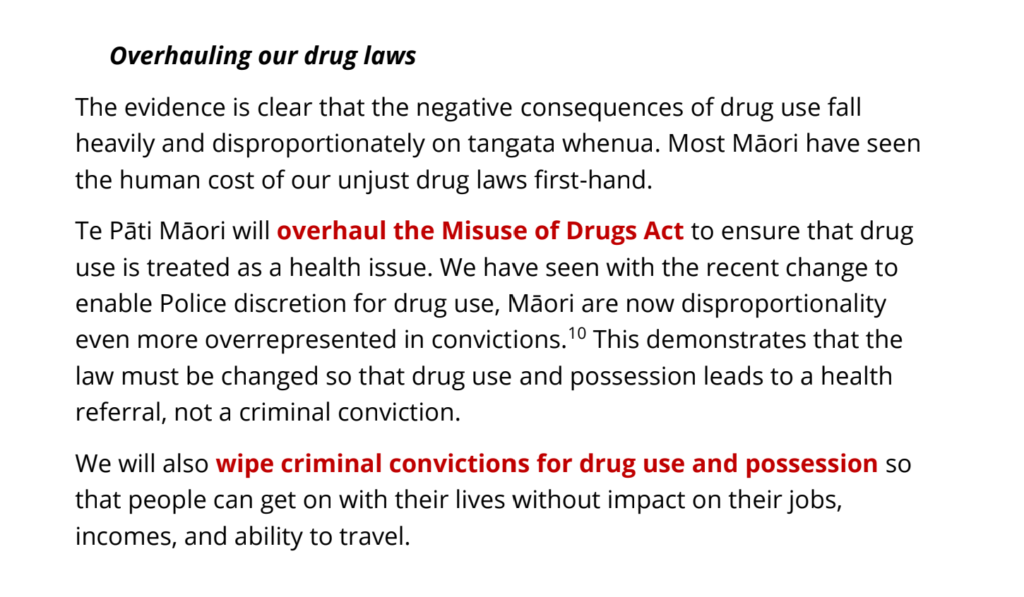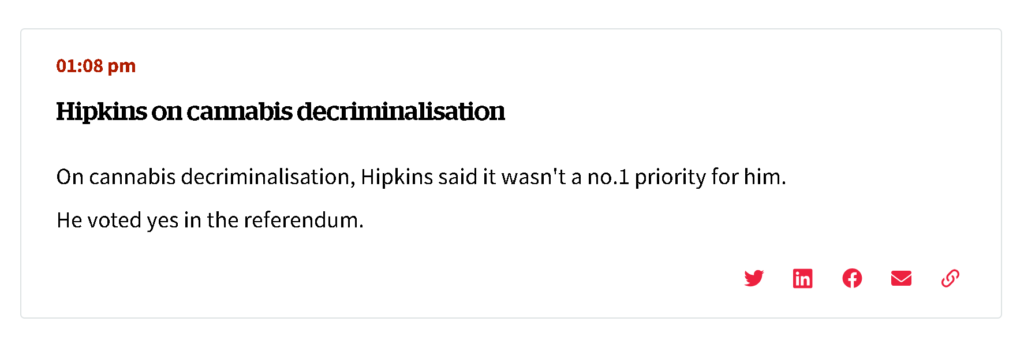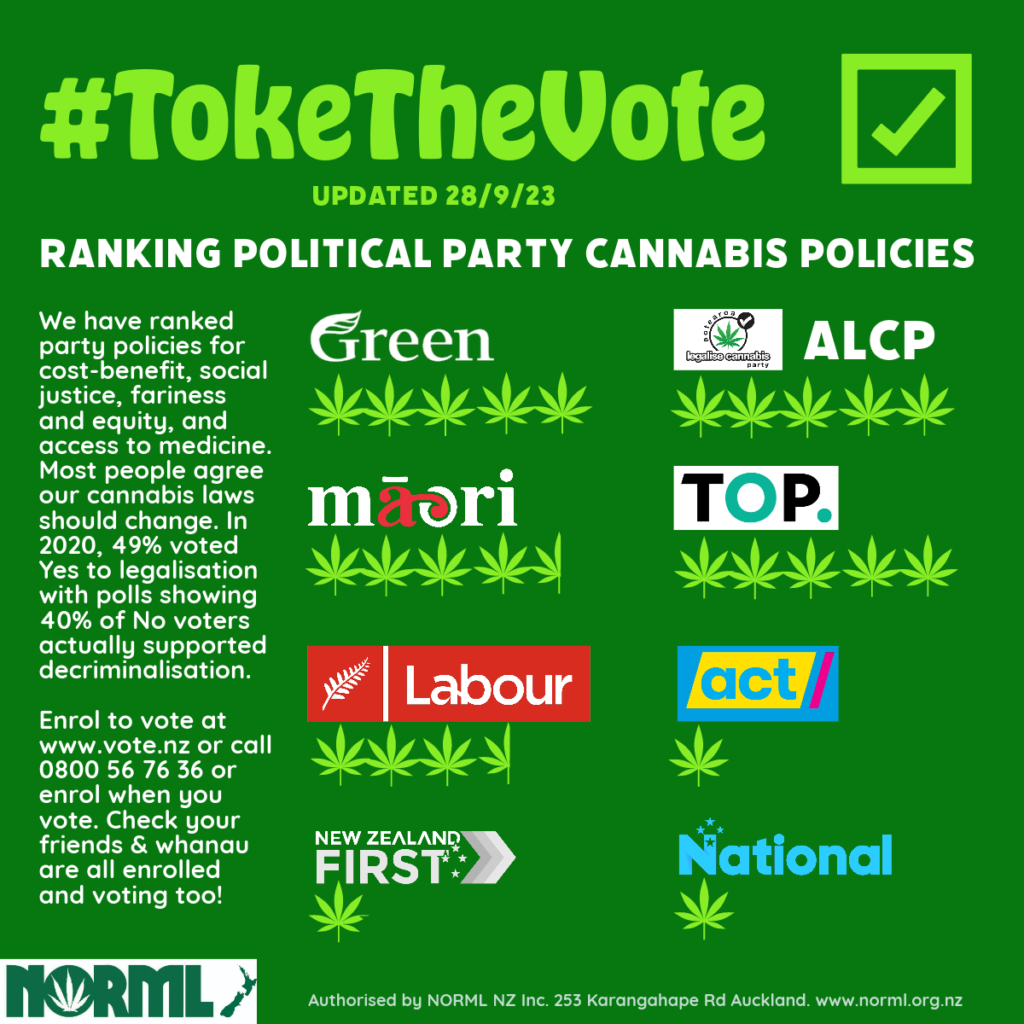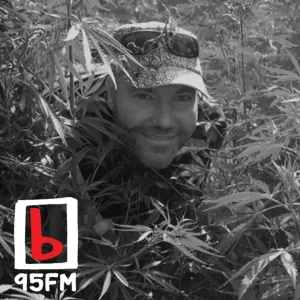OPINION – By Chris Fowlie. Originally published in The Daily Blog and the Marijuana Media pot-cast on 95bFM.
UPDATED: 14 September 2023: Te Pati Māori will make cannabis a health issue, not a crime. Listen to the Marijuana Media pot-cast on 95bFM.
UPDATED 21 September 2023: Neither Chris will decriminalise cannabis (unless we force them to). Listen to the Marijuana Media pot-cast on 95bFM.
UPDATED 28 SEPTEMBER 2023: Hipkins open to drug law review; Luxon ‘happy’ drug users are criminals; TOP’s new drugs policy tops our voting guide. Listen to the Marijuana Media pot-cast on 95bFM.
Cannabis-based voting in the election
Voting has now begun, ahead of polling day on 14 October. Radio New Zealand has produced a guide to party policy but, so far, the only mention of cannabis there is from the Greens: “regulate personal use of cannabis”.
A new policy guide from Interest.co.nz summarises the Greens policy, with Chloe as spokesperson, and also shows ACT, Labour, National, NZ First, Te Pāti Māori and TOP all with policy “Not yet available on their website.”

The lack of cannabis or drugs policies from parties other than The Greens, at 30 August 2023.
Neither guide includes the Aotearoa Legalise Cannabis Party, which is regularly showing at 1 per cent in polls, around the same as TOP, the New Conservatives and Freedoms NZ. For that 1 per cent (at least) cannabis is the top issue.
To protect the reforms we have got, and keep moving in that direction, conscientious cannabis consumers should vote for candidates and parties who will not take us backwards. Their party websites may avoid mentioning cannabis, but their spokespeople keep on talking and sometimes they are actually worth listening to.
Pharmacy Today has covered a debate, MC’d by RNZ journalist Guyon Espiner, held on Monday night at Wellington College which featured spokespeople for all the major parties discussing mental health and drug law reform. Drawing on that, an ODT article from last year (where political parties stand on drugs), the televised Leader’s Debates, and NORML’s “Toke The Vote 2020” guide, here is what we know:
Presenting our 2023 Guide to Political Party Pot Policies (updated)

Green Party
★★★★★ The rational vote. The Greens pushed hardest for medicinal cannabis, got us the referendum, the only parliamentarian actively advocating for change is Chloe Swarbrick, and the Greens are the only major party that actually has a drugs policy. The Green Party 2023 drug law reform policy (“A healthy approach to alcohol and other drugs”) says:
Repeal and replace the Misuse of Drugs Act 1975 with an evidence-based approach, which reduces harm and treats drug use as a health issue.
Regulate the personal use of cannabis to minimise the risk of harm to users, their whānau, and communities. This will include tight restrictions on advertising and the location of retail outlets.
Improve the framework for medicinal cannabis and create a new framework for trials of therapeutic uses of other controlled substances such as psychedelics.
This is all great stuff. While there is no mention of decriminalising all drugs, the reference to retail outlets suggests “regulate personal use of cannabis” means full legalisation of cannabis (something like the referendum model).
The full Green Party drug law reform policy 2016-2023, which spells out it also includes home cultivation of cannabis and expunges criminal convictions, says under their policy “Evidence from overseas jurisdictions with legal cannabis markets is assessed to determine which model best minimises harm”.
In the Pharmacy Today article, Parties go head to head on mental health, Greens spokesperson Chloe Swarbrick advocates a consistent and evidence-based approach to managing all drugs, including alcohol, and said they would repeal and replace the Misuse of Drugs Act 1975 and remove the profit motive from these substances.
ALCP
★★★★★ The protest vote. As a co-founder of the Aotearoa Legalise Cannabis Party back in 1996 they will always have a place in my heart, and ticking the leaf on the ballot sends a message that this is your number one issue.
Legalise Cannabis is running electorate candidates to further raise awareness in local areas including Northland, Te Tai Tokerau, Auckland Central, Wellington Central, Christchurch Central and Hastings.
TOP
★★★★★ The principled vote. Last election TOP had possibly the best cannabis policy on offer. In 2023 they advocate regulating cannabis like alcohol, with this on the TOP website, under “law and order”:
Legalise, regulate and tax the sale and supply of cannabis, by incorporating it into the Sale and Supply of Alcohol Act 2012, and remove cannabis from the Misuse of Drugs Act 1975.
Elegant in it’s simplicity, this would make cannabis subject to all the same provisions as alcohol, such as licensed producers and providers, and home growing treated like home brewing.
Abe Grey, TOP candidate for North Shore, told NORML they would also adopt the recommendations of the Law Commission’s inquiry into liquor laws. That included measures to curb access and basically do the stuff Chloe Swarbrick was attempting with her private member’s bill (and more).
TOP also supports “further research into psychoactive drugs and mental health treatment.”
Te Pāti Māori
★★★★.5 The compassionate vote. Te Pāti Māori told the Otago Daily Times they support the decriminalisation of all drugs, would “wipe the slate on all low-level drug convictions”, and enable medical professionals to prescribe certain illicit drugs as part of addiction treatment programmes. They say “Our current drug laws are only fit for purpose if that purpose is to continue to oppress and imprison tangata whenua.”
Your voting choices just got better with the release of Te Pati Māori’s justice policy, which includes reforming drug laws to treat drug use as a health issue, not a criminal one, and wiping criminal records for use and possession.
A NZ Herald report said the party would repeal “discriminatory legislation”, such as overhauling the Misuse of Drugs Act, amending the Clean Slate Act to apply to custodial sentences, and would require police to wear body cameras.
Read the full Te Pati Maori justice policy here. Here’s the section on drugs:

It’s a bit light on detail, but this is effectively decriminalisation with health referrals (like Portugal) plus expungement of criminal records. The rest of Te Pati Māori’s justice policy is far more “revolutionary”, such as a pathway towards abolishing prisons.
Their plan to reform the justice system aims to challenge institutional racism that, according to a report on Te Ao Māori News this week, co-leader Rawiri Waititi said has “traumatised and failed Māori communities at every level”.
Labour
★★★ The sensible vote. Made medicinal cannabis legal, kick-started local production and licensed cultivation, licensed substance checking services, and brought in police discretion leading to a huge reduction in arrests (although the remaining arrests continue to be biased against Māori). Any further progress will probably require a Labour-led Government. They still get points off for Jacinda Ardern not voicing her support for a Yes vote, and for not progressing decriminalisation since then. At the Wellington debate, Labour’s Dr Verrall said:
Labour would not be making any further moves towards decriminalisation of drugs but its advice to prosecutors to exercise discretion in these cases remains in place.
In the first televised leader’s debate, Labour leader Chris Hipkins said “No” to a quick-fire question on decriminalisation.

Stuff ranked it Number One in a list of “A few surprising things from the first leaders debate”.
- Neither Chris thinks weed should be decriminalised
Both Hipkins and Luxon gave a quick “no” when asked if cannabis should be decriminalised.
Politically, it’s somewhat surprising that both major parties have come to a consensus on an issue which the country is pretty much 50/50 on.
At the 2020 election, 48.4% of people voted in support of legalising cannabis. The referendum failed, with a very slim majority of 50.7% opposing the suggestion.
Decriminalisation is generally seen as a step below legalisation. Legalised cannabis would allow its sale and commercialisation, whereas decriminalisation would just remove the ability for police to charge someone with possession of cannabis.
After the debate, Hipkins told reporters he voted in favour of legalisation in 2020.
Newsroom’s political editor Jo Moir also listed it first among their litany of same as the other guy responses (“First leaders’ debate light on new insights”).
Their acquiescence to the status quo was also noted by Newshub (“Where Hipkins, Luxon stand on popular issues”) and the NZ Herald (“Who won the TVNZ leaders’ debate as Chris Hipkins, Christopher Luxon clash”).
After the debate, Hipkins pointed out he voted Yes in the referendum. Unlike Adern and the Nats, he actually encouraged people to vote Yes.
He possibly didn’t hear it right, because during the following leader’s debate on Newshub, Hipkins was quick to support reform, in contrast to National leader Christopher Luxon.
During the Newshub leader’s debate, the first ‘Quick Fire’ question from Paddy Gower was “Which is more harmful, alcohol or cannabis?” Both said alcohol – no doubt.
Gower then reminded Hipkins he had voted Yes but since then had “done nothing” for decriminalisation, and people were still being locked up.
Hipkins replied that he recognised the decision of the New Zealand public, who were given that choice and did not vote for it.
But Gower pointed out that was legalisation, not decriminalisation.
Hipkins then said he wouldn’t rule out further changes in the future (after saying “no” at the 1News debate) but said he would like issues of drugs and decriminalisation to be approached on a “bipartisan basis”.
Hipkins pointed out National opposed pill testing legislation and still talking about boot camps and being tough on crime.
Adding this all up, Labour gets 3 leaves and our ‘steady as she goes’ rating.
NZ First
★★ The contrarian vote. Winston’s party insisted on the cannabis referendum rather than direct law reform – and we still don’t know how he voted.
National
★ The prohibitionist vote. Former leader Judith Collins instructed all National MPs to cast their personal votes against the cannabis referendum. They block voted against medicinal cannabis. Don’t forget National said they would not guarantee passing the Referendum Bill, even if a majority had voted Yes.
But this week, in the Pharmacy Today article, National’s Matt Doocey supports decriminalisation but not legalisation of drugs, adding some people need a “line in the sand” to know a behaviour is wrong.
It is progress that they are saying these things at all. But these are personal views – the National Party policy. And as Russell Brown pointed out on a Facebook post I was tagged into:
The National Party has opposed every single drug reform measure to come up for a vote in the past six years. The Parliamentary party is the most conservative it’s been in decades. Matt Doocey is on the more rational side personally, but no, they are not going to suddenly reverse course and be drug reformers.
Russell further warned we should hope that if National lead the next government, they won’t reverse the substance checking legislation or ban the prescription of cannabis flower. “having carried on like both those things were the end of the world when they were legislated.”
UPDATE: Matt Doocey was misquoted. A video of the debate now online appears to show Doocey opposing both decriminalisation and legalisation of cannabis – true to previous National Party positions.
On the recent Newshub leader’s debate, Christopher Luxon rejected a bipartisan approach to decriminalisation, saying he was “happy with the current settings”.
At least than means, if we can believe it, the Nats won’t go backwards.
But can we believe it? Luxon seemed confused what the current settings actually are. Earlier on the Newshub debate, Gower had posed the scenario of teens caught with ecstasy at a festival – are they criminals?
Luxon says the current settings are right. Gower again asks are they criminals? Luxon says no but won’t commit to changing crimes act. Gower asks why if they’re not criminals? Luxon backtracks and says yes actually they are criminals. There are boos from the crowd at that.
ACT
★★ The hypocritical vote. Libertarians and freedom lovers should be champions of drug law reform, and ACT told the Otago Daily Times: “ACT supported having a referendum on cannabis law reform. Most ACT MPs voted yes. We are sceptical about prohibition in general and don’t believe it has been a successful policy on drugs.”
But ACT seldom mention it and don’t do anything about it. Aside from Simon Court’s revelation of being shot over cannabis as a teenager, and Seymour’s confession he had tried the Devil’s Lettuce, ACT has no official drugs policy. But according to Pharmacy Today, at the Wellington debate this week ACT’s deputy leader Brooke van Velden:
supported decriminalising drug users and providing them addiction support services but cracking down on drug suppliers. She was against Ms Swarbricks’ proposal to ban advertising of alcohol because “people need to have free choice”.
Update: ACT has now released policy seemingly to support the domestic meth industry by legalising pseudoephedrine so that local cooks can once again compete with transnational smugglers (See: BREAKING BAD ACT wants domestic meth production to soar – their most controversial policy to date!). ACT also has a new welfare policy which takes a harder line on beneficiaries with addiction issues.

For more, listen to the Marijuana Media pot-cast on 95bFM

